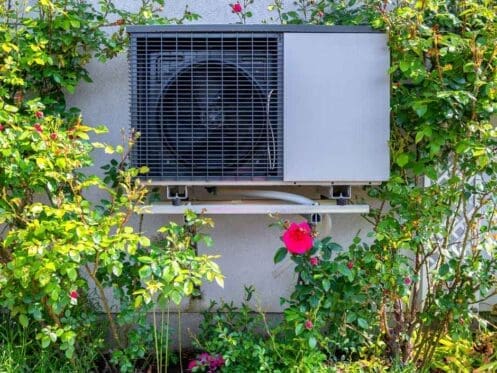Heat pumps have gained popularity as energy-efficient alternatives for heating and cooling homes, especially in moderate climates. However, like any heating and cooling system, heat pumps come with their unique set of benefits and limitations. Whether you’re interested in reducing energy costs or want a greener option, understanding the advantages and disadvantages of heat pumps can help you determine if this system is the best choice for your home.
What Are the Advantages of a Heat Pump?
When it comes to choosing a heat pump, homeowners are often drawn to the multiple advantages these systems offer. Here are some of the top benefits to consider:
1. Energy Efficiency
Heat pumps are known for their high efficiency, as they use a minimal amount of electricity to transfer heat rather than generating it. This process can be up to four times more efficient than traditional heating methods, which means significantly lower energy bills. For homeowners who prioritize reducing their carbon footprint, heat pumps are an excellent choice since they rely on renewable energy to operate.
2. Dual Function for Heating and Cooling
Unlike traditional HVAC systems that separate heating and cooling functions, heat pumps provide both in a single unit. During winter, a heat pump extracts heat from the outdoor air or ground and brings it indoors. In summer, it reverses the process, acting as an air conditioner by removing heat from the inside of your home. This dual capability makes heat pumps an all-in-one solution for temperature control, simplifying maintenance and repairs.
3. Environmentally Friendly
Since heat pumps transfer heat rather than burning fossil fuels, they emit fewer greenhouse gases than conventional heating systems like gas or oil furnaces. Choosing a heat pump for your home can contribute to a reduction in harmful emissions, helping you lower your environmental impact. This eco-friendly benefit aligns well with Charleston homeowners looking for sustainable ways to stay comfortable year-round.
4. Potential for Long-Term Savings
Although the initial cost of heat pump installation can be high, these systems often lead to long-term savings. With regular maintenance, heat pumps can last 15–20 years, providing efficient heating and cooling throughout their lifespan. As utility costs continue to rise, the savings generated by a heat pump’s efficiency can make it a worthwhile investment.
What Are the Disadvantages of a Heat Pump?
While heat pumps have many advantages, they also come with a few disadvantages that homeowners should consider:
1. Higher Initial Installation Cost
One of the primary disadvantages of heat pumps is the upfront cost of installation. Heat pumps are generally more expensive than traditional HVAC systems, which may make them a less appealing option for homeowners on a budget. The installation process can be complex, requiring an experienced professional, like Charleston Heating & Air, to ensure the system functions efficiently. Although the energy savings can help offset the initial cost over time, the upfront expense may be a barrier for some.
2. Performance in Cold Climates
Heat pumps work well in mild climates, like Charleston’s, but their efficiency can decrease significantly in regions with harsh winters. As temperatures drop, air-source heat pumps struggle to extract enough heat from the outdoor air, leading to increased reliance on a backup heating source, such as electric resistance heaters. This additional energy consumption can drive up costs and impact the overall efficiency of the system. Ground-source heat pumps are more effective in cold climates but are even more costly to install.
3. Requirement for Regular Maintenance
While heat pumps are generally durable, they do require regular maintenance to maintain optimal performance. Homeowners need to schedule annual maintenance visits to ensure the system’s components are clean and in good working condition. Neglecting maintenance can lead to reduced efficiency and costly repairs. However, working with Charleston Heating & Air’s professional heat pump repair services can help minimize these issues, keeping your system running smoothly.
4. Potential Noise Levels
Heat pumps, especially air-source models, can produce noticeable noise during operation, as the outdoor unit’s fan and compressor are in constant use. While many modern systems are designed to be quieter, it’s still important to consider placement and any noise-mitigating features when installing a heat pump. For those who prioritize a silent system, consulting a professional can help identify quieter models that best suit your home’s layout.
How to Decide if a Heat Pump is Right for Your Home
Choosing between a heat pump and a traditional HVAC system depends on several factors, including your budget, climate, and environmental goals. Here are some considerations to guide your decision:
- Climate Suitability: If you live in a milder climate, a heat pump may be the perfect fit. For colder climates, a dual-source option or supplemental heating may be necessary.
- Budget Flexibility: While the initial installation cost is higher than a standard furnace or air conditioner, the long-term savings on energy bills can make up for the initial expense.
- Environmental Impact: For those committed to reducing greenhouse gas emissions, the environmentally friendly benefits of heat pumps make them an ideal choice.
- Space Requirements: Heat pumps often require additional space for installation. If space is limited, consult with Charleston Heating & Air to explore compact or ductless mini-split options.
Heat Pump Installation and Repair Considerations
Given the complexities of heat pump installation, it’s essential to work with experienced professionals who can ensure proper setup and function. A poorly installed heat pump can lead to inefficiencies, increased repair needs, and a shortened system lifespan. Additionally, regular heat pump maintenance is crucial to prevent breakdowns and extend the system’s life.
For homeowners who already have a heat pump, timely heat pump repair services are essential when issues arise. Prompt repairs can prevent minor problems from escalating into costly damages, allowing you to continue enjoying the energy efficiency and convenience of your system.
Heat Pumps Offer Unique Benefits with Some Considerations
In summary, heat pumps offer several advantages, such as energy efficiency, dual heating and cooling functions, and reduced environmental impact, making them an appealing option for many homeowners. However, they also come with disadvantages, including a higher initial cost, possible noise issues, and limitations in colder climates. By understanding these advantages and disadvantages of heat pumps, you can make a more informed decision that aligns with your needs and lifestyle.
If you’re considering a heat pump for your Charleston home, or if you already have one that needs professional attention, Charleston Heating & Air is here to help. Our expert team provides comprehensive heat pump installation and repair services, ensuring that your system operates efficiently year-round. Contact Charleston Heating & Air today for all your heat pump needs, and experience the difference a professionally installed and maintained heat pump can make in your home.

